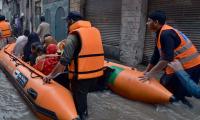A prolonged spell of rain on Monday brought life in Karachi to a complete standstill and exposed all the earlier claims of the authorities regarding their preparations for the monsoon. At least 15 deaths were reported due to rain-related incidents in the city, many areas of which suffered from power breakdown lasting for several hours, while severe traffic jams were witnessed on the thoroughfares as they remained inundated throughout the day.
A low pressure area had caused rain in south-east Sindh, including Hyderabad, Thatta, Badin, Mirpurkhas and Nawabshah, on Sunday. Under the influence of the same low pressure, rain started in Karachi in the morning hours of Monday continued till the filing of this report at night.
With 60 millimetres of rainfall, the civic infrastructure of the provincial capital collapsed with power breakdown and inundated roads. The rain forced a large number of people to remain indoors.
“A low pressure formed in the Bay of Bengal resulted in first proper rain in Karachi which started this morning and expected to continue till Tuesday night or early Wednesday morning. So far, on average, around 60 millimetres of rain has been recorded in Karachi and we are expecting this to continue for at least next 18-24 hours”, said Sardar Sarfraz, Sindh chief meteorological officer, as he spoke to The News on Monday night.
He said under the influence of the current weather system, the Pakistan Meteorological Department was expecting rain till Tuesday evening and after that light drizzle was expected in the city.
“There would be another spell of light rain between August 2 and 3 but it would be comparatively lighter than this system”, Sarfraz said.
Casualties
At least 15 deaths were reported in the city in rain-related incidents, most of which were due to electrocution.
A 30-year-old man, Ismail, died in the Boat Basin area after he received electric shocks from a pole, the police said. His body was shifted to Jinnah Postgraduate Medical Centre (JPMC).
Azeem, 35, son of Ziaul Hassan, was electrocuted to death in Khamosh Colony within the limits of the Rizvia police station in District Central. The police said he received electric shocks from an electricity pole near his residence. The body was taken to the Abbassi Shaheed Hospital.
An 18-year-old man, Dilshad, died after he received electric shocks in the Mehmoodabad area.
Another electrocution incident occurred at a house on Khayaban-e-Tanzeem in Defence Housing Authority Phase V. A 30-year-old man, Sharafat Ali, lost his life in the incident. The body was shifted to the JPMC.
An 18-year-old youth, Rasool, son of Fazal Maula, died of electrocution in Gulistan-e-Jauhar Block 19. His body was also shifted to the JPMC.
A girl playing in a street in Akhtar Colony in the Mehmoodabad area died on the spot when she was electrocuted by an electricity pole. She was identified as 11-year-old Farzana. Her body was taken to the JPMC.
A youth, 18-year-old Irshad, son of Bashir, died of electrocution near Nursery within the Ferozabad police station’s limits. His body was shifted to the JPMC for an autopsy and later handed over to the family.
A 30-year-old man, identified as Saad, son of Ahmed Hussain, died of electrocution near Sarafa Bazaar in Nazimabad’s Paposh Nagar area. His body was taken to the Abbassi Shaheed Hospital. In an electrocution incident in Baldia Town No 3, a 35-year-old man, Ibrahim, died. His body was taken to the Civil Hospital.
Twenty-year-old Shah Zaman was electrocuted to death near Ghani Chowrangi in the SITE area while a 48-year-old woman, identified as Gul Bibi, died after she received electric shocks in the Sohrab Goth area.
A man identified as Saleem, son of Subhan, drowned near Bengali Jerry within the Ibrahim Hyderi police station’s limits. His body was shifted to the JPMC from where his family took it away without having medico-legal formalities completed.
Another unfortunate incident took place in the Malir City area where an electricity wire fell on two children playing in the street, killing them on the spot. The victims were identified as 10-year-old Mehrab, son of Jubran, and nine-year-old Umer, son of Raza. Their bodies were shifted to the JPMC.
Later, the families of the deceased boys held a protest against the incident, which caused massive traffic jams in the Malir area. The protesters demanded that the higher authorities take strict action against the responsible authorities.
A 13-year-old boy, Akmal Khan, son of Daud Khan, was electrocuted to death near his residence in the Qayyumabad area within the limits of the Korangi Industrial Area police station. His body was sent to his hometown Quetta for burial after medico-legal formalities were completed at the JPMC. Many persons were also injured in rain-related incidents. They included a 12-year-old boy of Musharraf Colony of the Mauripur area, a 50-year old man, Salman Farooq, who received electric shocks in Macchar Colony, and a 40-year-old man, Karim Shabbir, who was critically injured when the roof of his house collapsed in MPR Colony Block C in the Manghopir area.
Educational institutions closed
Many schools and colleges announced a day-off for the students and staff on Monday while some children were picked up early from their schools by their parents in view of the prediction of heavy rain and the lack of transportation facilities due to rainwater on roads.
As the rain is expected to continue today (Tuesday), the authorities have announced the closure of all the educational institutions today. The education department also asked its officers to ensure that rainwater was not accumulated in schools so that classes could be resumed on Wednesday.
According to the authorities, all the educational institutions
Power breakdown
Tripping of over 600 feeders caused a massive power breakdown in Karachi on Monday morning. Power supply had not been restored to over 60 per cent areas of the city till Monday night.
Conceding the power crisis, K-Electric (KE) said it was due to technical faults caused by the rain, adding that its teams were trying to restore power in the city.
As this story was filed, most areas of the city in all its six districts were without power. Due to the prolonged power interruption, uninterruptible power supply (UPS) systems at many houses also stopped working, causing great trouble for the residents.
The power breakdown also caused water crisis as people could not run their water pumping motors. Many people also had their mobile phones discharged as they could not charge them in the absence of power.
The KE, however, claimed that its teams restored power to many areas in a timely manner.
“While many areas of the city experienced power outage, especially areas of Jail Chowrangi, Cifton, Defence, Gulshan, Nazimabad, Gizri, PNT Colony, Numaish, Punjab Chowrangi, Korangi, Landhi and Garden, these were re-energised in a timely manner despite challenging ground conditions,” a KE spokesperson said adding that the KE teams' presence was felt across the city as they remained engaged in restoring power to the remaining areas while adhering to necessary safety protocols in view of the accumulated water on roads.
The spokesperson added that power supply to strategic installations, including key hospitals and the pumping stations of the Karachi Water & Sewerage Board, was maintained.
An extra high tension line of the Sindh Transmission and Dispatch Company also tripped during the early hours of the day and the restoration work was still under way on it, the spokesperson maintained.
The power utility also urged the public to stay away from broken wires and refrain from taking shelter under transformers or leaning against poles during the rainy and windy weather and also avoid using illegal means (kundas) to get power.
Court proceedings affected
Monsoon rains in Karachi also disrupted the electric supply to the Supreme Court’s Karachi Registry, the Sindh High Court and other courts in the city, resulting in court proceedings being affected. The court proceedings were conducted by restoring electricity through generators and emergency lights. K-electric officials said several feeders tripped due to rains in the city.
KU campus
Vice Chancellor University of Karachi Professor Dr Khalid Mahmood Iraqi visited different areas of THE KU campus and inspected the emergent situation after the heavy rainfall.
The vice chancellor issued immediate directives for the drainage of rainwater. He said that the residents must keep themselves away from the electric poles and the parents shouldn’t allow their children to go outside to avoid any inconvenience. On his directives, heavy machinery was deployed for the drainage of sewerage lines.
Residents said that the broken roads were also a big issue of the varsity, and they hoped that the sewage and road issues would be resolved very soon.
Dr Khalid Iraqi vowed to resolve the issues of the KU with its own resources and said that no external help would come to resolve the issues. “We have to face and solve our problems on our own.” Faraz Khan also contributed to this report.
Mazar-E-Quaid can be seen in Karachi. — AFP/FileCelebrating ShakespeareThe National Academy of Performing Arts is...
Mr. Jamil Khan, ABL Group Chief CRBG South presents Rs. 1 million cheque to Fatimid Foundation Executive...
Awami National Party supporters during a party rally on January 25, 2024. — Facebook/ANP Khyber PakhtunkhwaThe...
This representational image shows speakers reading their poetry during a session of the Aalmi Mushaira. — Arts...
ACP President Muhammad Ahmed Shah addresses the opening ceremony of Sindh Theatre Festival 2024 Sukkur along with...
The Sindh High Court building. — SHC website/FileThe Sindh High Court on Monday repeated notice to Pakistan Peoples...







